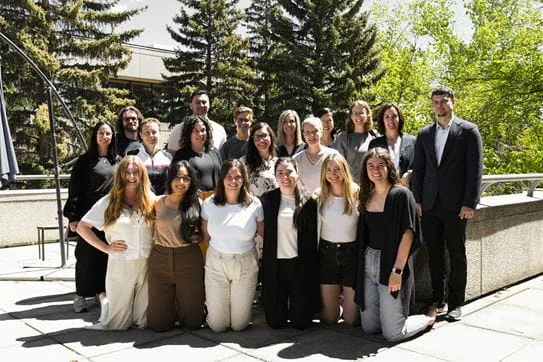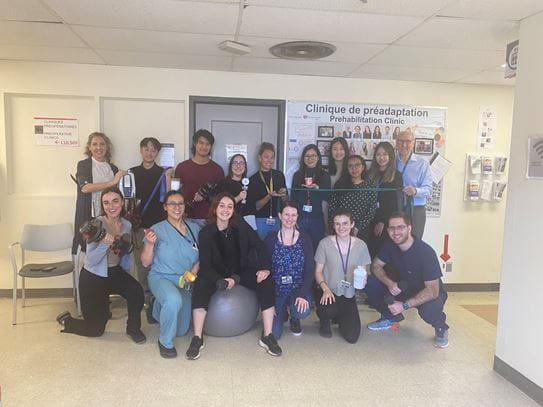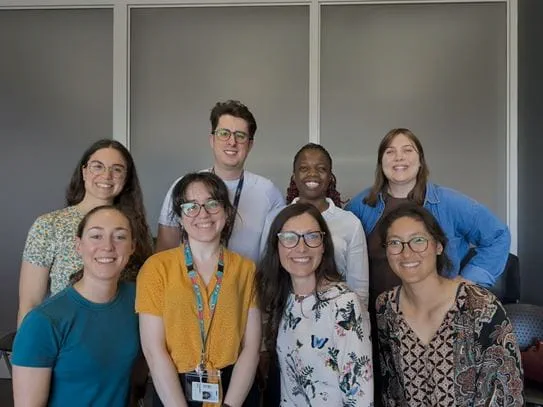Exercise and wellness have lots of advantages for people with cancer – before, during and after treatment. These practices can help to manage and improve physical and mental health. They can also help with treatment-related side effects and, in some cases, lower the risk of cancer returning, leading to longer survival.
The Canadian Cancer Society (CCS) is proud to fund a wide range of research projects focused on encouraging exercise to improve the well-being of people living with or beyond cancer. Below are 5 examples:
Helping rural cancer survivors exercise more

It’s easy for doctors to say, “go be active,” but if there are no exercise programs for people to go to and they don’t know how to get started, “it’s pretty tough,” says Dr Nicole Culos-Reed at the University of Calgary.
With a CCS Cancer Survivorship Team grant, Dr Culos-Reed and her team are expanding their success in developing community-based exercise programs for cancer survivors across Canada. Through these programs, fitness experts in rural settings are partnering with healthcare providers in urban centres to create high-quality exercise programs for cancer survivors in their local communities.
“We have so much evidence that exercise should be part of standard cancer care, but it’s not,” Dr Culos-Reed says. “Our cancer care system is focused primarily on the disease. Through our exercise programs and training resources, we want to build wellness into people’s journeys so that they can cope better. There’s no downside to doing this. The upside is that we’re going to have a healthier population of cancer survivors.”
Preventing treatment-related side effects in people with ovarian cancer

People with cancer who exercise frequently and eat well are less likely to experience significant side effects from chemotherapy and recover more quickly than those who don’t. That’s why Dr Chelsia Gillis at McGill University is working with them to improve physical, nutritional and mental wellness in anticipation of treatment-related stress to promote recovery.
With a CCS Challenge grant, Dr Gillis and her team are developing a prehabilitation program aimed at helping people with ovarian cancer to improve their fitness and nutrition as well as muscle mass and strength during chemotherapy and surgery. Through this program, participants receive exercise recommendations, nutritious snacks and tools to help them stay calm when experiencing emotional distress. If successful, this project could help prevent treatment-related side effects and improve outcomes and quality of life for those affected.
“We know that people with cancer prefer to actively prepare, rather than passively wait, for surgery,” Dr Gillis says. “Our goal is to enhance cancer care with pre-emptive strategies that make better use of the waiting period for ovarian surgery.”
Adapting a telerehabilitation program for men with cancer

Men are less likely to use the support services available to people with cancer than women. To help change that, Dr Corentin Montiel at the Centre de recherche du CHUM is working with men and their families to adapt and assess a physical activity and education program at the hospital.
With a CCS Research Training award, Dr Montiel is working with a team to adapt a supervised telerehabilitation program for people with cancer and their caregivers in Quebec that combines group physical activity sessions with an educational program. The team is studying what men from different sexual orientations, gender identities, ages and immigrant backgrounds need and want, with the goal of increasing their use of supportive care services that contribute to their health and recovery and help them through their cancer experience.
“My interest in cancer research stems from a desire to understand and enhance the overall experience of individuals facing health challenges,” Dr Montiel says. “Witnessing the impact of cancer on patients and their families motivates me to explore ways to improve their well-being through effective supportive care services.”
Culturally tailored physical activity and wellness program for First Nations communities

First Nations people in Canada have higher rates of cancer than non-Indigenous people. To tackle this issue, Dr Ian Newhouse at Lakehead University is teaming up with an Indigenous community in northern Ontario to design and implement a physical activity and wellness program to prevent chronic diseases and cancer.
With a CCS Action grant, Dr Newhouse and his team are working with Sandy Lake First Nation to explore a process to develop a culturally appropriate physical activity and wellness program for cancer prevention and healthy living. The team is working with the community to host a one-day health fair and evaluate cancer prevention and healthy living knowledge. Additionally, they are interviewing community partners to obtain feedback on community needs and program implementation processes.
“To ensure our project is successful, we are using participatory action and a train-the-trainer method for program sustainability and transferability to neighbouring communities,” Dr Newhouse says. “These findings will identify barriers and facilitators to physical activity and wellness for Sandy Lake First Nation and potentially other First Nation communities across Canada.”
Implementing physical activity to improve quality of life for people with cancer

As a physiotherapist, Dr Jenna Smith-Turchyn at McMaster University has seen the results of cancer treatment and knows the benefits that rehabilitation and regular activity can have on a person, both physically and psychosocially. With a CCS Emerging Scholar Research grant, she and her team are conducting a multi-centre trial to support well-being and minimize burden during treatment for people with cancer.
The researchers are building on previous work around an exercise and self-management strategy based in institutions in Ontario. Working with experts in rehabilitation, oncology, research methodology as well as people with cancer and caregivers, the team hopes to make physical activity services more accessible to all people with cancer during treatment.
“I’m excited to be able to implement this program to provide more accessible services promoting rehabilitation and physical activity to a wide range of individuals undergoing cancer treatment across Ontario,” Dr Smith-Turchyn says. “By doing this we hope that more people in Canada will experience the physical and psychosocial benefits of regular physical activity participation during and after treatment.”
To learn more about the importance of reducing the risk of cancer as well as helping people with cancer live longer and with improved quality of life during and after treatment, check out our research strategy.
